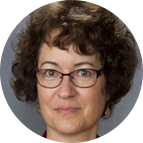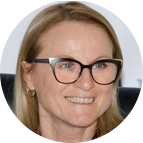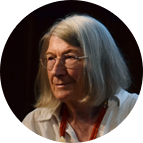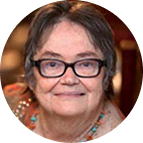Maternal Gift Economy: Breaking Through -
Ongoing Salons
Every two weeks
Follow Up Q&A and Discussion - Dec 3, 2022
3rd Annual Maternal Gift Economy Movement Conference
Featuring Susan Petrilli, Mary Condren, Heide Goettner-Abendroth, Darcia Narvaez, and Genevieve Vaughan
Moderated by Letecia Layson.

Darcia Narvaez
Presentation topic - The Maternal Gift Economy: Sharing, Morality and Human Nature
The maternal gift economy follow’s Nature’s gift economy, an ecological system that keeps individuals and communities flourishing. I discuss how sharing is part of human evolution, distinguishing us from other primates. Sharing predominates in egalitarian communities. In sharing cultures, those in most need receive the most time, attention, materials, not those with more status or power. Young children are often the neediest. Feminist theorist Virginia Held (1993) suggested that child raising is best considered the center of moral activity because by facilitating the right kind of development it fosters the best kind of new persons. The flourishing of children comes about from nurturing them in species-normal ways, meeting their basic needs through the evolved nest, thereby forming the foundation for a flourishing community (Narvaez, 2014, 2018). Why do some argue still that we are more like chimpanzees than our own sharing, egalitarian ancestors and cousins? It is my contention that the move away from cooperative child raising and the provision of the evolved nest has underdeveloped our species’ evolved nature, shifting brain functioning back to our primate mind, to our survival systems, to an emphasis on ape-like dominance hierarchies and hoarding. Shifts in child raising practices and adult mindsets are needed to restore flourishing communities.
Darcia Narvaez is Professor Emerita of Psychology at the University of Notre Dame, Fellow of the American Psychological Association and American Educational Research Association. She employs a lifespan, interdisciplinary approach to studying evolved morality, child development and flourishing. She blogs for Psychology Today (“Moral Landscapes”) and hosts the webpage EvolvedNest.org.

Susan Petrilli
Susan Petrilli is Full Professor of Philosophy and Theory of Languages, University of Bari Aldo Moro, Italy, where she teaches Philosophy of Language, Semiotics, Semiotics of Law and Intercultural Translation, Semiotics of Translation. She has been affiliated with the University of Adelaide, Australia since 2016, where she is Visiting Research Fellow at the School of Psychology, Faculty of Health Sciences and Medical Sciences. She is honorary member of the Institute of Semiotics and Media Studies, Sichuan University, China. For the International Association for Semiotic Studies she has served as treasurer (2004-2014) and subsequently as vice-President (2014-2020). She is Fellow of the International Communicology Institute, Washington. In 2008 she was installed as the 7th Sebeok Fellow of the Semiotic Society of America. As part of this honour, a volume of her essays was distributed on and for that occasion as a Special Issue of The American Journal of Semiotics (TAJS 24.4). This included an expanded version of her keynote lecture, “Semioethics and Responsibility. Beyond Specialisms, Universalisms and Humanisms”, delivered for the occasion in the framework of the 33rd Annual Meeting of the Semiotic Society of America, 17th October 2008. A main focus of her theoretical work is the relation between signs, values and behaviour. This has led to her conceptualization of “semioethics” and of the “semiotic animal”. She develops translation theory in the framework of global semiotics, linking philosophy of language, semiotics and biosemiotics. Victoria Welby’s “significs” is another special focus in her work. The results of her research are reflected in her numerous publications including monographs and essays. Recent publications in English include: Signifying and Understanding (2009), Sign Crossroads in Global Perspective. Semioethics and Responsibility (2010), Expression and interpretation in Language (2012), The Self as a Sign, the World and the Other (2013), Victoria Welby and the Science of Signs (2015), Sign Studies and Semioethics (2014), The Global World and Its Manifold Faces (2016), Signs, Language and Listening. Semioethic Perspectives (2019). And collective projects edited by her include: Translation and translatability in intersemiotic space, Punctum – International Journal of Semiotics, vol. 06/01 (2020); Brian Medlin, The Level-Headed Revolutionary. Essays, Stories and Poems (2021); Exploring the Translatability of Emotions. Cross-Cultural and Interdisciplinary Encounters and Intersemiotic Approaches to Emotions. Translating across Signs, Bodies and Values (2022).

Mary Condren
Presentation topic - The Motherland: Alienation, Sacrifice and War
Motherland discourse permeates the horrific images we see nightly from Ukraine. Putin has willingly risked (and sacrificed) the lives of thousands of young Russian men to achieve an undivided Motherland. On the other hand, in the face of such an aggressor, Ukrainian soldiers willingly risk their lives in defence of their Motherland. Two different agendas, but they each focus on a Motherland, lost or to be defended.
Throughout history, the causes of wars have been multiple; yet the overt causes, land, economics, and natural resources (oil), conceal underlying psychic issues that make wars intractable (and attractive). Drawing on Irish discourses in the wars of the 20th century, this presentation will explore how the suppressed and ambivalent maternal re-emerges in the form of hate and love, and how the discourses of sacrifice, described as both poison and cure, provide an overarching form of legitimation.
Mary Condren, Th.D is director of Woman Spirit Ireland and a Research Fellow at the Centre for Gender and Women’s Studies in the School of Histories and Humanities at Trinity College Dublin. Her critical work concerns the role of violence and the discourses of sacrifice in contemporary politics. Her constructive work focusses on recuperating the indigenous female traditions of Old Europe in Ireland.
More information @ The Centre for Gender and Women’s Studies and Academia.edu/MaryCondren

Heide Goettner-Abendroth
Presentation topic - A Radical Alternative: Matriarchy
It is becoming increasingly clear that we need a radically different cultural model on all levelsof society than the destructive patriarchal patterns, which bring humankind ever closer to the brink of extinction.
The matriarchal model is radically different, and it has great significance for our future aswomen and mothers, and of humankind in general. Therefore, we must develop many ideasand a vision for new mother-centered, egalitarian and peaceful societies, that is, for modernmatriarchal societies. Of course, we cannot imitate traditional matriarchal societies, but we cangain much stimulation and insights from them, which – unlike theoretical utopias – have beenlived over millennia.
Their societal, economical, political, and spiritual patterns are of the utmost interest; they demonstrate how societies can be created and maintained free of violence, based on maternal values and gender-equality as well as on gift economy and active peace building.
Some practical ideas will be given how this vision can be implemented by empowering women in economic, social, political and cultural respect.
Dr. Heide Goettner-Abendroth is a mother and a grandmother. She earned her Ph.D. in philosophy of science at the University of Munich where she lectured for ten years (1973-1983).
She has published on philosophy of science, and extensively on matriarchal society and culture, and through her lifelong research on matriarchal societies has become a founder of Modern Matriarchal Studies. In her magnum opus: Matriarchal Societies. Studies on Indigenous Cultures across the Globe, (New York 2013, Peter Lang), she defines scientifically this new field of knowledge and provides a world tour of examples of contemporary matriarchal cultures.
She has been visiting professor at the University of Montreal in Canada, and the University of Innsbruck in Austria. She lectured extensively at home and abroad. In 1986, she founded the “International ACADEMY HAGIA for Matriarchal Studies” in Germany, and since then has been its director.
She guided three World Congresses on Matriarchal Studies: 2003 in Luxembourg, 2005 in Texas, U.S., and 2011 in Switzerland. She received several awards and was twice nominated as candidate for the Nobel Peace Prize, in 2005 by a Swiss initiative, 2007 by a finish initiative.
More information @ www.hagia.de and www.goettner-abendroth.de.

Genevieve Vaughan
Presentation topic - The Maternal Gift Economy as the Deep Alternative to Patriarchal Capitalism
"How can we become independent of the thought structures of the male-dominated system? Women’s struggles risk being assimilated back into the system unless a genuine alternative paradigm is developed — a paradigm based on intellectual and theoretical criticisms capable of truly overcoming the limits of the system."(From the program of the Kurdish Women's conference Nov. 5-6, 2022)
I propose the maternal gift economy paradigm as a deep alternative to the economy and the "thought structures of the male-dominated system" then make some suggestions about the influence of market exchange on male gender construction and consequently on the make-up of patriarchal capitalism. The interlocking of two economies - gift and exchange- has created a system that is draining the world of all its life-giving gifts. A return to the maternal economy is necessary for the survival of all the children of Mother Earth.
Genevieve Vaughan (b.1939) is an independent researcher who lives part time in Italy and part in Texas. She created the multicultural all-woman activist Foundation for a Compassionate Society (1987-2005) and the Temple of Sekhmet in the Nevada desert (1992 – ongoing) and she co-created the network: International Feminists for a Gift Economy (2001 – ongoing). Her books are For-Giving, a Feminist Criticism of Exchange (1997), Homo Donans (2006) and The Gift in the Heart of Language: the Maternal Source of Meaning (2015). She has edited Il Dono/The Gift (2004), Women and the Gift Economy (2007) and The Maternal Roots of the Gift Economy (2019). A volume of the Canadian Women’s Studies Journal dedicated to the maternal gift economy has just appeared (2020).
More information @ www.gift-economy.com.

Letecia Layson
Letecia Layson is a Filipina, Feminist, Futurist, Priestess of Morphogenesis (Form Coming Into Being), High Priestess of Diana; Priestess Hierophant in FOI/TOI-LA. Letecia is one of the founding Mothers of the Center for Babaylan Studies; a member of International Feminists for Gift Economy, Modern Matriarchal Studies Network
